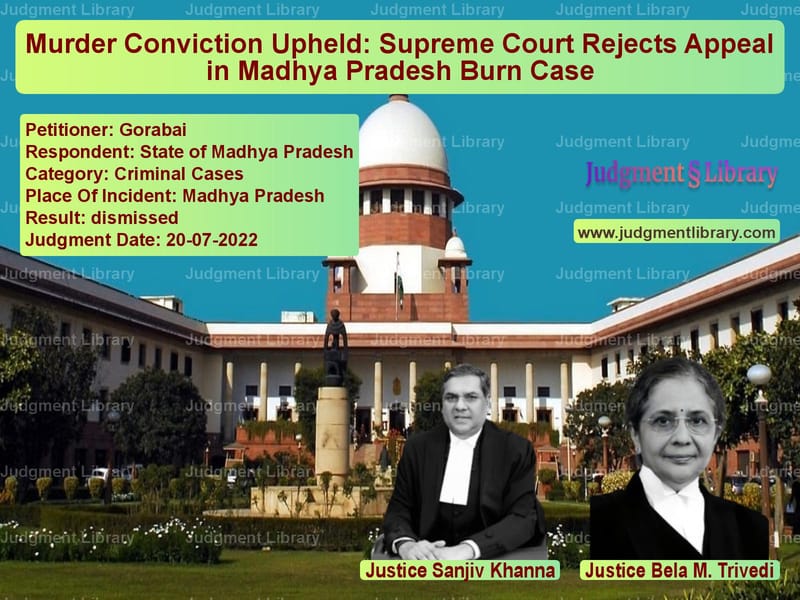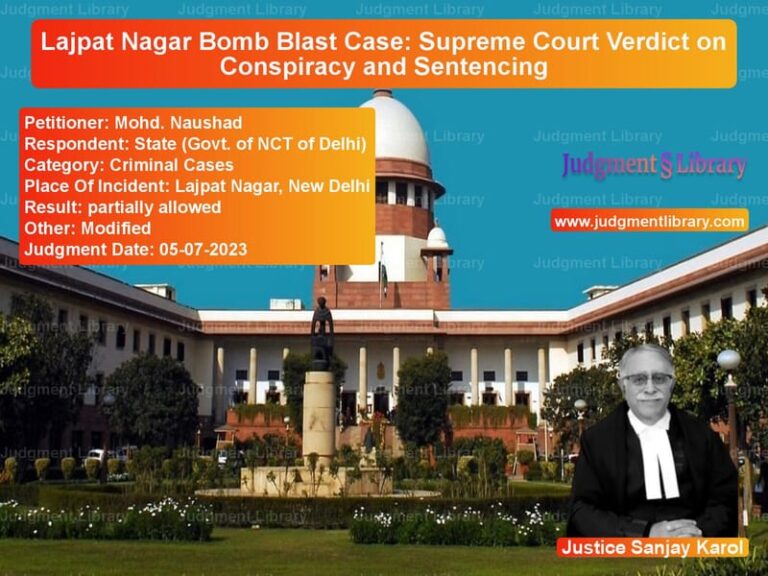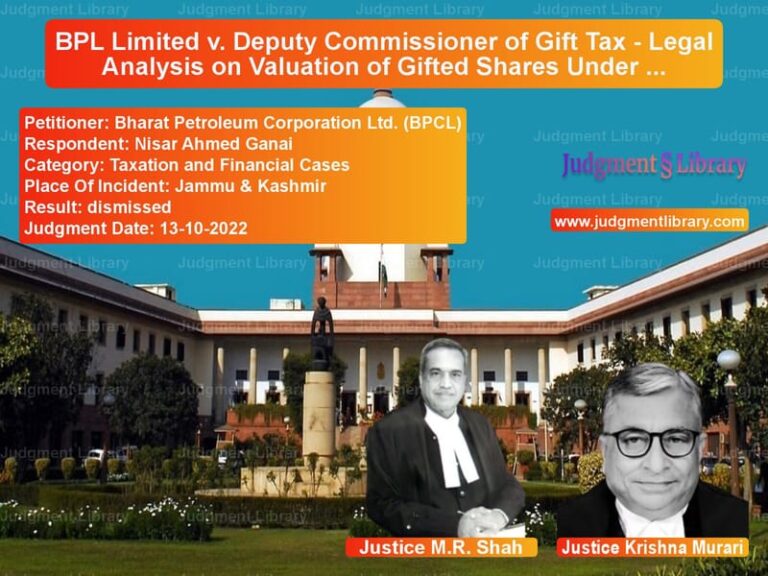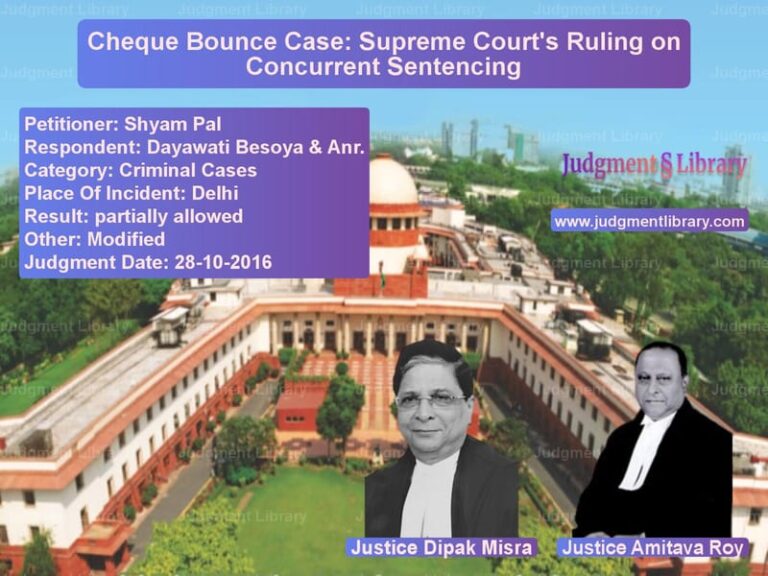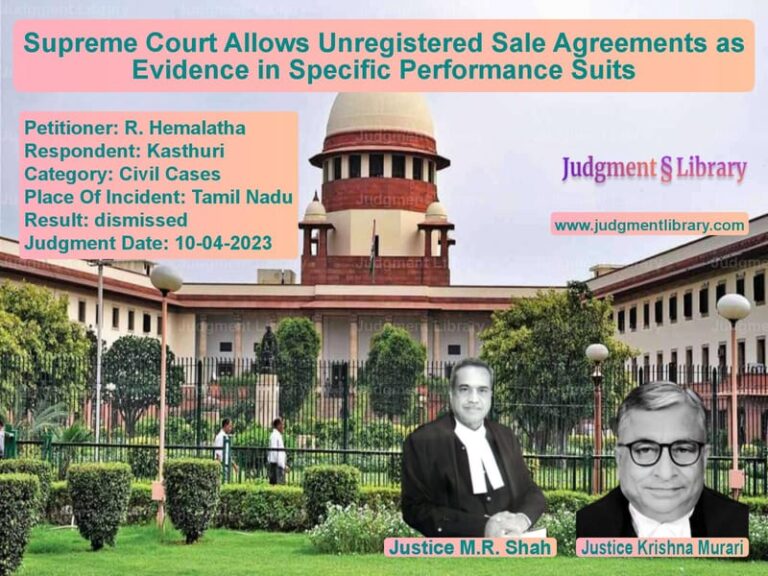Murder Conviction Upheld: Supreme Court Rejects Appeal in Madhya Pradesh Burn Case
The case of Gorabai vs. State of Madhya Pradesh is a significant judgment concerning the conviction of multiple accused under Section 302 read with Sections 147 and 149 of the Indian Penal Code (IPC). The Supreme Court was called upon to decide whether the conviction based on dying declarations and circumstantial evidence could be upheld. The case serves as a crucial precedent in matters involving dying declarations and the role of multiple accused in a murder case.
Background of the Case
The case arose from an incident that took place on July 31, 1996, where Nandabai and her three minor daughters were allegedly set on fire in their home. The prosecution alleged that the accused, including Seventibai, Kalabai, Natwar, Hosilal, and Gorabai, committed the crime due to a long-standing family dispute.
The appellants were convicted based on both oral and written dying declarations made by Nandabai before she succumbed to her injuries. The trial court sentenced the accused to life imprisonment, and the Madhya Pradesh High Court upheld the conviction. The matter was then brought before the Supreme Court.
Read also: https://judgmentlibrary.com/ndps-bail-reversed-supreme-court-cancels-bail-in-drug-trafficking-case/
Prosecution’s Arguments
The prosecution, represented by the State of Madhya Pradesh, argued:
- Multiple dying declarations: Several witnesses, including family members and police officers, testified that the deceased clearly identified the accused as the perpetrators.
- Recorded dying declaration: The statement given by the deceased to City Superintendent of Police Ravi Shankar (PW-13) was signed by a doctor and corroborated by witnesses.
- Eyewitness accounts: Tarabai (PW-1), Munna Lal (PW-3), Kailash (PW-5), Durga Das (PW-6), and Tarachand (PW-16) all testified that they heard the deceased naming the accused before she died.
- Motive: The accused had personal enmity with the deceased, as they believed she was responsible for spreading rumors about Gorabai having an illicit relationship with her husband.
- Medical evidence: Doctors confirmed that the deceased suffered extensive burn injuries and died due to shock.
Defense’s Arguments
The defense, representing the appellants, contended:
- Inconsistencies in dying declarations: The oral statements given by the deceased varied, with some witnesses naming only Seventibai and Kalabai, while others included all the accused.
- Absence of direct evidence: No eyewitness actually saw the accused setting the victims on fire.
- Unreliable recorded dying declaration: The doctor who signed the written dying declaration was not examined in court.
- Hostile witnesses: Some witnesses, including Surpanch Babu Lal (PW-4), turned hostile and did not fully support the prosecution’s case.
Supreme Court’s Observations
The Supreme Court, comprising Justices Sanjiv Khanna and Bela M. Trivedi, analyzed the evidence and made the following key observations:
“The dying declarations are fully corroborated by the evidence on record. The alleged discrepancies as contended by the learned counsel for the appellants are minor in nature and do not, in any way, dent the court testimony of the witnesses on the oral and the recorded dying declaration of Nandabai.”
Read also: https://judgmentlibrary.com/supreme-court-upholds-conviction-in-andhra-pradesh-murder-case/
The Court further noted:
- Multiple witnesses confirmed the dying declaration, which is a strong piece of evidence in Indian jurisprudence.
- The fact that some witnesses turned hostile did not weaken the case, as other reliable testimonies and evidence remained intact.
- Medical and forensic reports corroborated the prosecution’s case.
- The motive behind the crime was well-established, strengthening the circumstantial evidence.
Final Ruling
The Supreme Court dismissed the appeals and upheld the conviction and sentence of life imprisonment. The ruling concluded:
“In view of the aforesaid discussion, we do not have any hesitation in upholding the conviction of the appellants and the sentence awarded to them. Accordingly, the present appeals are dismissed.”
Key Takeaways
- Importance of dying declarations: A well-corroborated dying declaration can be the sole basis for conviction.
- Judicial consistency: Minor inconsistencies in statements do not necessarily weaken a case.
- Multiple accused can be convicted: Even if only some are directly involved in the act, others can be held guilty under Sections 147 and 149 IPC.
- Motive plays a crucial role: A clear enmity between parties strengthens the prosecution’s case.
Conclusion
The judgment in Gorabai vs. State of Madhya Pradesh reinforces the significance of dying declarations in criminal cases. It establishes that as long as such declarations are supported by reliable evidence, they can form the basis for conviction. The ruling also underscores the role of motive in murder cases, ensuring that justice is served even when direct eyewitnesses are absent.
Petitioner Name: Gorabai.Respondent Name: State of Madhya Pradesh.Judgment By: Justice Sanjiv Khanna, Justice Bela M. Trivedi.Place Of Incident: Madhya Pradesh.Judgment Date: 20-07-2022.
Don’t miss out on the full details! Download the complete judgment in PDF format below and gain valuable insights instantly!
Download Judgment: gorabai-vs-state-of-madhya-prad-supreme-court-of-india-judgment-dated-20-07-2022.pdf
Directly Download Judgment: Directly download this Judgment
See all petitions in Murder Cases
See all petitions in Bail and Anticipatory Bail
See all petitions in Legal Malpractice
See all petitions in Other Cases
See all petitions in Judgment by Sanjiv Khanna
See all petitions in Judgment by Bela M. Trivedi
See all petitions in dismissed
See all petitions in supreme court of India judgments July 2022
See all petitions in 2022 judgments
See all posts in Criminal Cases Category
See all allowed petitions in Criminal Cases Category
See all Dismissed petitions in Criminal Cases Category
See all partially allowed petitions in Criminal Cases Category

